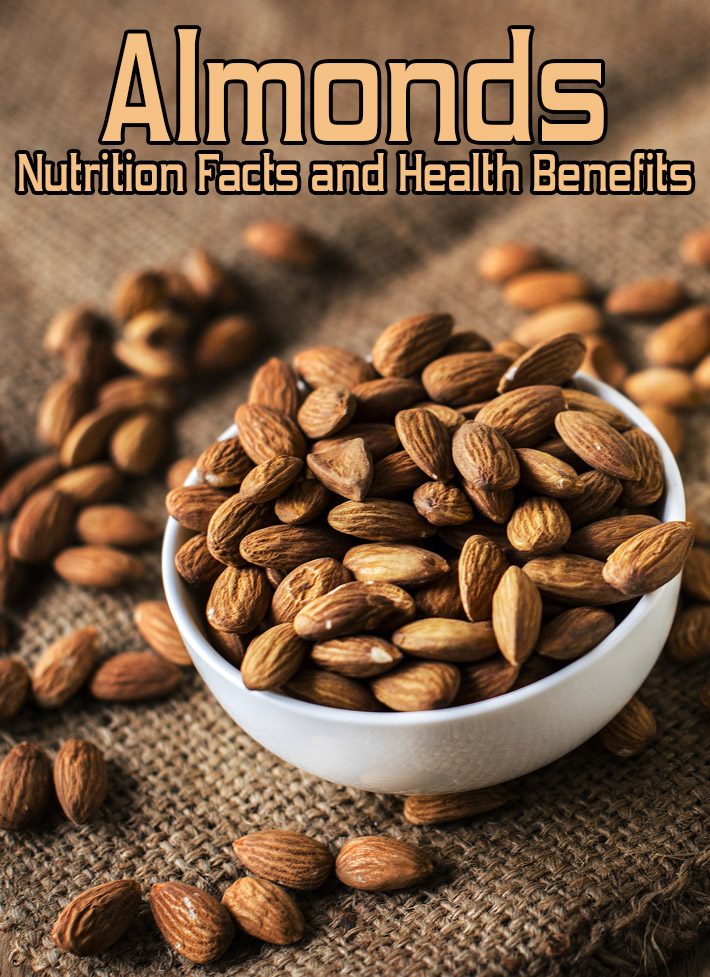
Almonds (Prunus dulcis) are the seeds of almond trees. They are closely related to cherries, plums and peaches. These nuts have been grown for thousands of years in the Mediterranean region, but today the US is the world’s largest producer. They are an excellent source of magnesium, vitamin E, fiber, unsaturated fats and many other nutrients.
Almonds may also promote weight loss and help reduce belly fat. Additionally, they have been shown to strengthen the immune system and help improve heart and digestive health. They may be eaten on their own, raw or toasted. They can also be made into almond flour, milk, syrup, butter and oil. Since they are gluten-free, they are often used in gluten free diets to replace wheat flour.
There are two main types of almonds: sweet and bitter. The sweet variety is edible, but the bitter nuts are processed for oil.
Nutrition Facts

Almonds consist of 49.9% fat, 21.6% carbs and 21.2% protein. An average-sized nut contains seven calories.
Carbs
They are relatively low in carbs. One ounce (28 grams) has six grams of carbs, most of which are fiber. They are also low in sugar, with only 1.2 grams per ounce.
Almonds have a low glycemic index, so they should not cause major spikes in blood sugar levels. This makes them suitable for diabetics.
Fiber
Almonds are high in soluble and insoluble fiber, which makes up about 12.5% of their weight. One ounce of almonds contains 3.5 grams of fiber.
Fiber helps moderate blood sugar by slowing absorption of carbohydrates. It has many other benefits as well, such as improved digestive health.
Protein
They are relatively high in protein, with 6 grams of protein per ounce. Protein is essential for growth and various body functions.
However, they are lacking in the essential amino acids lysine, methionine and threonine. Therefore, they are not considered a complete protein source.
That being said, almonds are a good source of the amino acid arginine. Arginine can help heal wounds, treat infections and maintain a healthy heart.
Fats
By weight, almonds are roughly 50% fat. About 90% of almond fat consists of mono- and polyunsaturated fatty acids, which have been linked to a reduced risk of heart disease.
The main fatty acids in almonds are oleic acid and the omega-6 fatty acid linoleic acid. However, about 10–15% of the fat in almonds isn’t absorbed by the body.
Vitamins and Minerals

Almonds contain high amounts of several important vitamins and minerals, including:
- Vitamin E: This antioxidant is essential for immune function and red blood cell formation. They are one of the world’s best sources of vitamin E.
- Vitamin B2: Also known as riboflavin, vitamin B2 is important for growth and red blood cell production.
- Magnesium: This mineral is essential for all living organisms. Magnesium is important for blood pressure, bone health and many other important processes.
- Manganese: This nutrient is needed for the immune system, reproduction, digestion and bone growth.
- Phosphorus: This mineral is very important for teeth and bone health.
- Iron: A metallic element that serves many important functions. It is an essential component of hemoglobin, a protein in red blood cells that carries oxygen throughout the body.
Almonds also contain decent amounts of calcium, potassium and zinc, as well as vitamins B1, B3 and B9.
Plant Compounds
These nuts contain beneficial plant compounds, including many powerful antioxidants:
- Resveratrol: Also found in red wine, resveratrol may have benefits for heart health, diabetes and cancer.
- Catechin: Catechin is one of over 20 types of flavonoid antioxidants found in almond skin.
- Epicatechin: Also found in cocoa and green tea, epicatechin may have beneficial effects on heart and brain health.
- Kaempferol: This antioxidant is linked to a reduced risk of chronic diseases and cancer.
- Quercetin: A beneficial plant compound with anti-inflammatory and anti-bacterial effects.
The combination of vitamin E and flavonoid antioxidants in almonds may be particularly effective, having synergistic effects.
Many of the antioxidants in almonds are concentrated in the skin. Therefore, you should eat the whole nut to maximize the health benefits.
Health Benefits of Almonds
Almonds have been linked with several health benefits. They have been shown to aid in weight loss, promote heart health, help protect against type 2 diabetes and improve digestive health.
Weight Loss
They have several characteristics that make them a weight loss friendly food. About 10–15% of the fat in them isn’t absorbed by the body, so fewer calories are actually consumed.
Additionally, they are relatively high in both protein and fiber. These nutrients are known to promote a feeling of fullness and help people reduce calorie intake. There is also some evidence that eating almonds, as well as other nuts, may slightly boost metabolism.
One study found that a low-calorie diet resulted in 62% more weight loss when supplemented with three ounces of almonds per day. Another study followed 100 overweight women and found that almonds helped them lose more weight and belly fat, compared to women who were not eating nuts.
Heart Health
Several studies link nut consumption to a lower risk of heart disease. Eating almonds on a regular basis has been shown to lower levels of LDL (the “bad”) cholesterol.
Consuming these nuts also appears to be beneficial for people who are already taking cholesterol-lowering drugs. They have been shown to help increase the effects of these drugs.
These nuts also protect the LDL particles from oxidative damage, which is linked to heart disease. One study found that eating almonds every day reduced oxidized LDL cholesterol by 14%.
Diabetes
Almonds are an excellent food for people with type 2 diabetes. They are low in carbs, but high in fiber, protein and healthy fats.
They are also loaded with magnesium, a mineral that many diabetics are deficient in. Magnesium plays an important role in insulin sensitivity and blood sugar control.
Several studies show that nuts, like almonds, can lead to significant reductions in blood sugar levels in people with type 2 diabetes.
Additionally, studies show that these nuts may reduce the inflammation and oxidative stress caused by diabetes. This indicates a reduced risk of diabetes-related complications, such as heart disease.
Digestive Health
The bacteria that reside in the digestive system are incredibly important for overall health, and have been linked to a reduced risk of many of diseases. One study shows that eating almonds can improve the balance of beneficial bacteria in the digestive system.
Adverse Effects

These nuts are well tolerated by most people. However, some people may be allergic to them, and bitter almonds are poisonous. They may also contribute to kidney stone formation.
Allergy
Almonds can cause mild to life-threatening reactions in allergic individuals. The symptoms can range from a runny nose, rashes or swelling, to life-threatening symptoms like breathing problems.
Poisoning
There are two types of almonds:
- Sweet almonds are edible and widely grown for human consumption.
- Bitter, or wild, almonds are inedible. They contain a substance called amygdalin, which is toxic. Eating even a few bitter almonds can be fatal.
If they are improperly stored they may also develop mold that produces aflatoxin, a dangerous chemical.
Kidney Stones
Kidney stones can develop from concentrated minerals in the urine, and 75% of them are mainly made of calcium oxalate.
These healthy nuts are high in oxalates, and these oxalates tend to be well absorbed by humans. For this reason, people with a tendency to form kidney stones should not consume too many almonds.
Mineral Deficiencies
They contain phytic acid, a substance that can inhibit the absorption of calcium, iron and zinc. However, this effect lasts only for the same meal.
People that consume foods rich in phytic acid with every meal may become deficient in essential minerals.

Almonds are an incredibly healthy food. They are nutrient-dense and loaded with healthy fats, fiber and powerful antioxidants.They may help prevent heart disease and fight diabetes. They may also help you lose weight and belly fat. Eating a handful of this healthy nuts every day can be an excellent addition to a healthy diet. They may literally be the perfect snack.




Leave a Reply